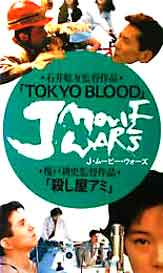Behold: the 1993 return to filmmaking by Japan’s brilliant Gakuryû—or Sogo—Ishii after a nine-year gap. His previous feature was THE CRAZY FAMILY/Gyakufunsha Kazoku (1984), an international hit that apparently wore him out, as he followed it with documentaries and shorts. Ishii returned to the fold, however, with his energy and inspiration fully intact; the made-for-Japanese television featurette TOKYO BLOOD only lasts 33 minutes, but it has enough inspiration and stylistic versimilitude for a dozen conventional features.
The subject is modern day (as of the early 1990s) Tokyo, which forms the setting of four standalone segments. The first, “Street Noise,” deliberately harkens back to the kineticism of previous Ishii films like BURST CITY/Bakuretsu toshi (1982), which was lensed TOKYO BLOOD’s cinematographer Norimichi Kasamatsu.
In “Street Noise” an anonymous city dweller (Tatsuo Yamada) is driven mad by the dehumanizing nature of urban life. Taken as a dark mood piece, the segment is strong, with rapid-fire montage editing, varying sound levels and a droning underscore that imparts discomfort and anxiety. It must be said, however, that Ishii’s protégée Shinya Tsukamoto did this sort of thing far better in films like TETSUO (1989) and TOKYO FIST (1995).
“Bicycle” forsakes the wildness of the previous entry (and Ishii’s earlier films) in favor of a thoughtful and evenly paced treatment that harkens forward to mid-to-late 1990s Ishii efforts like ANGEL DUST/Enjeru dasuto (1994) and LABYRINTH OF DREAMS/Yume no ginga (1997). It features a twentyish pregnant woman (Sumiko Ohyama) looking to spice up her dull existence by asking a young stranger on a bike (Chiemi Tachihara) to kidnap her. A woman-to-woman chat reveals that the bike rider has AIDS, and these two, united by their shared dissatisfaction, form a quick, if extremely short-lived, bond. The hoped-for kidnapping doesn’t occur, nothing is resolved and the ladies, following an epic two-person bike ride through Tokyo, end up going their separate ways.
“Hole” refers to an unidentified man (Tomoro Taguchi) who constantly repeats that word. It’s up to a pair of no-nonsense doctors (Suzuki Matsuo and Toshiya Sakai) to figure out precisely what that means, and in so doing reconstruct the man’s identity. What we learn, presented via an extended flashback, is that the man was a maintenance worker who after entering a manhole (the first of several holes) traverses an underground cavern (the second), where he becomes obsessed with breaking through a wall (the third), presumably to escape life in the city. Cut back to the here-and-now, in which the doctors become infected with whatever bizarre malady it is that’s possessing their patient.
“Heart of Stone,” which serves as an abbreviated dry run for Ishii’s subsequent feature AUGUST IN THE WATER/Mizu no naka no hachigatsu (1995), is the most overtly experimental of the quartet. The major inspiration appears to have been the cinema of Maguerite Duras, which—as represented by films like THE TRUCK/Le camion (1977) and AGATHA AND THE LIMITLESS READINGS/Agatha et les lectures illimitées (1981)—tended to consist of disconnected people-less images held together by voice-over descriptions and dialogue.
We hear the voice of an unseen young woman (Mai Hosho) talking about a mysterious, and possibly extraterrestrial, rock that’s directly responsible for an outbreak of “Stone Disease.” This disease, which causes people to assume stone-like countenances, eventually sweeps the entire world, leading to a drastic turn in human evolution that explains why we hear but don’t see the narrator. Over her monologue we see images of rippling water, decayed structures and, of course, rocks. Such a science fictional treatment may seem out of place, but it suggests that an escape from urban ennui is possible, albeit only through highly unorthodox means.
Thematically, TOKYO BLOOD never delves too deeply, with the four segments feeling like brief warm-ups for feature film iterations (which part four actually was). Once again: TOKYO BLOOD’s subject matter had already been effectively, and thoroughly, mined by 1993, but the pic’s visual brilliance and stylistic bravura attest to a talented filmmaker who in many respects was just getting started.
Vital Statistics
TOKYO BLOOD
Wowow
Director: “Sogo Ishii” (Gakuryû Ishii)
Producers: Takenori Sento, Masaetsu Sato
Screenplay: Sogo Ishii, Isamu Uno
Cinematography: Norimichi Kasamatsu
Editing: Shûichi Kakesu
Cast: Chiemi Tachihara, Sumiko Ohyama, Tomoro Taguchi, Toshiya Sakai, Suzuki Matsuo, Hairi Katagiri, Mai Hosho, Tatsuo Yamada, Masashi Kojima

